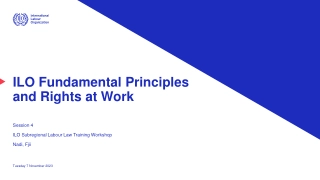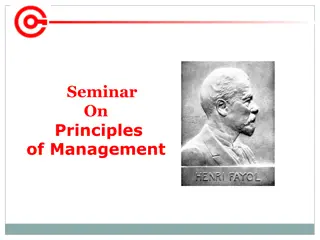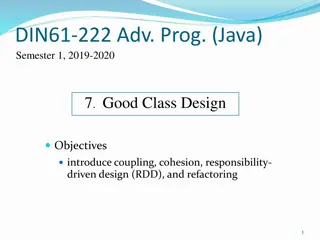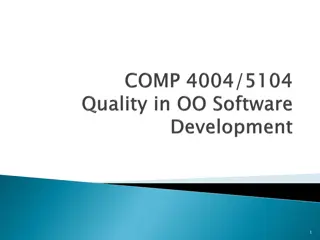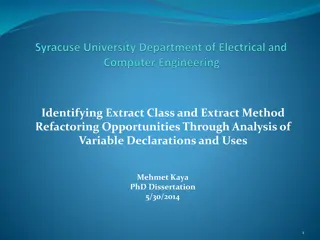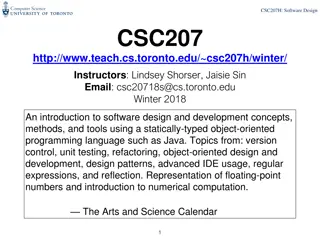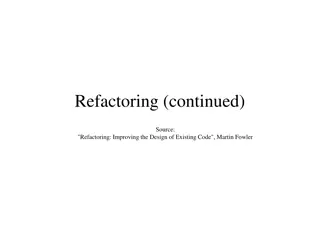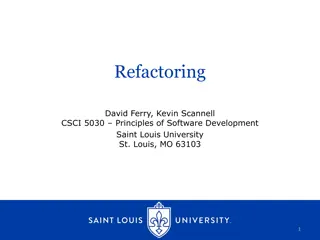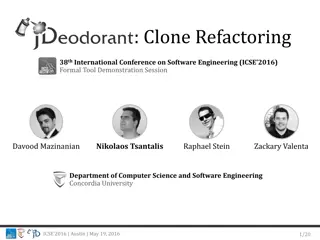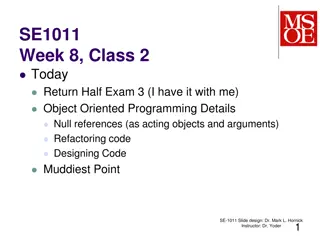ILO Fundamental Principles and Rights at Work
Explore the 5 fundamental principles and rights at work outlined by the ILO, emphasizing social justice and decent work. Delve into how these principles connect with ILO conventions and discuss challenges in their application to Pacific Island Countries.
0 views • 15 slides
Understanding Open Government Data Principles and Benefits
Open Government Data (OGD) principles and policies play a vital role in promoting transparency, citizen engagement, innovation, and data-driven decision-making in government operations. Governments worldwide are adopting open data policies to enhance accessibility, reusability, collaboration, privac
0 views • 36 slides
Principles of the Ghana Civil Service Code of Conduct
The Code of Conduct for the Ghana Civil Service, outlined by Elizabeth Obeng-Yeboah, emphasizes principles such as abiding by the constitution and laws with dignity, integrity, and professionalism. It sets standards for conduct, avoiding conflicts of interest, maintaining political neutrality, and u
1 views • 34 slides
InterManager's General Principles of Conduct and Action
InterManager, a prominent trade association in the shipping industry, has established General Principles of Conduct and Action to uphold ethical standards, promote safety, environmental protection, and continuous improvement. These principles guide members towards integrity, professionalism, and acc
2 views • 72 slides
Advocating Together for Academic Freedom - Importance and Principles
Advocating for academic freedom is crucial for the advancement of knowledge and quality education. The American Association of University Professors (AAUP) champions academic freedom, shared governance, and economic security for faculty members. The 1940 Joint AAUP/AAC&U Statement of Principles on A
4 views • 14 slides
Understanding the Core Principles of the 2030 Agenda for Sustainable Development
Explore the key features and principles of the 2030 Agenda for Sustainable Development with a focus on its core principles of Universality, Leaving No One Behind, Interconnectedness and Indivisibility, Inclusiveness, and Multi-stakeholder Partnerships. This comprehensive agenda encompasses 17 Sustai
5 views • 11 slides
Academic Freedom and Shared Governance in Higher Education
Academic Freedom and Shared Governance are foundational principles advocated by the American Association of University Professors (AAUP) to ensure educators have the freedom to explore, research, teach, and discuss without censorship. These principles empower educators to enhance student learning an
0 views • 9 slides
Essential Principles of Management Discussed in Seminar
Explore the foundational principles of management discussed in a seminar on principles of management. Delve into topics such as division of work, authority, discipline, unity of command, and unity of direction as outlined by Henri Fayol. Gain insights into the importance of these principles for effe
0 views • 22 slides
International Law of War: Nuremberg Principles and Accountability
The Nuremberg Principles, derived from the trials of Nazi officials for war crimes, establish accountability in international law. These principles hold individuals responsible for committing acts considered crimes under international law, regardless of their position or orders received. The assumpt
2 views • 22 slides
Promoting Ethical Principles in Social Science Research
Explore the challenges and strategies for translating and applying ethical principles, especially in emergency contexts. Learn key questions in social science research and how to ensure information contributes to community actions. Understand the importance of considering ethical principles in all w
0 views • 21 slides
Study Guide for Principles of Management Course at Africa Research University (ARU)
Welcome to Africa Research University (ARU)! This study guide is designed to help you navigate through the Principles of Management course (Course Code: PRM4) at ARU. It provides an introduction to the course content, emphasizing the importance of developing management skills to effectively lead and
1 views • 40 slides
Understanding Fruitful Functions in Python
Exploring the concept of fruitful functions in Python, which are functions that return a value defined by the programmer. We delve into the definition, examples, and usage of fruitful functions, along with refactoring techniques and the handling of return values in functions.
1 views • 25 slides
Key Principles of Insurance Explained with Visuals
Understanding the principles of insurance is crucial for both insurance seekers and companies. The principles include Utmost Good Faith, Insurable Interest, Indemnity, Contribution, and Subrogation. These principles ensure transparency, fairness, and protection for policyholders. Visual representati
0 views • 6 slides
Exploring Class Design in Java Programming: Coupling, Cohesion, RDD, and Refactoring
Delve into the world of Java programming with a focus on class design principles such as coupling, cohesion, responsibility-driven design (RDD), and refactoring. Understand the importance of good design for code quality, ease of debugging, maintenance, and reusability. Dive into the adventure of Zuu
0 views • 39 slides
Principles of Training: Overload, Specificity, and Progression
Principles of training encompass overload, specificity, and progression. Overload requires doing more than usual, specificity involves tailored activities, and progression ensures gradual advancement. These principles are vital for improving fitness levels safely and effectively, emphasizing the nee
8 views • 17 slides
Efficient Specification Mining for Trustworthy Software Development
Explore the approach of utilizing code trustworthiness measurements to mine specifications with minimal false positives. Understand the significance of specifications in software projects and how they contribute to debugging, testing, maintenance, refactoring, and documentation. The focus is on gene
0 views • 49 slides
Understanding Software Development Processes in Java Testing
Gain insights into Test-Driven Development (TDD), refactoring, metrics, xUnit patterns, Model-Based Testing (MBT), JUnit, Cucumber, state-based MBT, and scenario testing challenges in Java. Explore requirements documentation, customer feedback, development processes, and testing methodologies. Under
0 views • 14 slides
CSSE 375: Software Construction and Evolution - Course Overview and Final Exam Preview
Delve into the world of software construction and evolution with CSSE 375. Explore topics such as software degradation, information loss due to change, and the art of avoiding pitfalls in software development. The course covers essential aspects like software change, refactoring, program understandi
0 views • 21 slides
Effective Partnership and Mutual Accountability in Nutrition Clusters
The content discusses the minimum commitments needed for participation in Nutrition Clusters, explains the Principles of Partnership, and explores how these principles can enhance coordination and accountability to affected populations. It emphasizes partner commitments, such as leadership, mainstre
0 views • 7 slides
Refactoring Methods for Composing Code in Software Construction
Explore the key concepts of refactoring methods for composing code in software development. Learn about techniques such as Extract Method and how they can improve code readability, maintainability, and reusability. Understand the process of creating well-named methods and optimizing code structure f
0 views • 23 slides
Overview of Fundamental Principles of Space Law and Outer Space Treaties
The content discusses the fundamental principles of space law highlighted at the United Nations Space Law Conference 2020, focusing on key treaties such as the Outer Space Treaty of 1967 and associated rights, duties, and obligations of states in space exploration and use, including non-appropriatio
0 views • 16 slides
Overview of Directive Principles of State Policy in Indian Constitution
Directive Principles of State Policy (DPSP) in the Indian Constitution encompass social, economic, and political programs aimed at realizing ideals of justice, liberty, equality, and fraternity. They are non-justiciable but guide the state in legislative matters. Classified into Socialistic, Gandhia
0 views • 24 slides
Identifying Extract Class and Extract Method Refactoring Opportunities
The dissertation discusses identifying extract class and extract method refactoring opportunities through the analysis of variable declarations and uses. It covers the impact of maintenance phases on software quality and cost, software quality aspects, bad smells in code, and software refactoring pr
0 views • 65 slides
Improving Wireless Performance Through Content Overhearing Refactoring
Explore the concept of refactoring content overhearing to enhance wireless performance by focusing on throughput, leveraging overheard packets, suppressing duplicate data, and identifying sub-packet redundancy. Benefits of this approach include operating at finer granularity, redundancy elimination
0 views • 30 slides
Multi-Label Code Smell Detection with Hybrid Model based on Deep Learning
Code smells indicate code quality problems and the need for refactoring. This paper introduces a hybrid model for multi-label code smell detection using deep learning, achieving better results on Java projects from Github. The model extracts multi-level code representation and applies deep learning
0 views • 10 slides
Ranking Refactoring Suggestions Based on Historical Volatility
Design problems in software development can be identified based on non-compliance with design principles, excessive metric values, violations of design heuristics, and lack of design patterns. By assessing the urgency to resolve these problems using past code versions, a ranking mechanism can priori
0 views • 30 slides
CSC207H Software Design Course Overview
Winter 2018's CSC207H Software Design course focuses on software design and development concepts, methods, and tools using Java. The course covers topics like version control, unit testing, refactoring, object-oriented design, design patterns, and more. Students are expected to spend 8-10 hours per
0 views • 30 slides
Understanding FAIR Principles in Biomedical Research
The FAIR principles - Findable, Accessible, Interoperable, and Reusable - provide a framework for ensuring scientific data in biomedical research is managed and shared effectively. This informative session delves into the theory and practice of FAIR principles, emphasizing the importance of data qua
0 views • 28 slides
The FAIR Principles for Data Management and Stewardship
Embrace the FAIR principles - Findable, Accessible, Interoperable, Re-usable - for effective scientific data management and stewardship. Learn how annotations enhance data FAIRness and the key attributes of each principle. Dive into the high-level guiding principles that ensure data is globally uniq
0 views • 25 slides
Understanding the Guiding Principles for Evaluators
This content provides insights into the Guiding Principles for Evaluators, including their history, assumptions, and key principles such as Systematic Inquiry and Competence. The workshop aims to increase knowledge about ethical evaluation practices and stimulate discussions within the evaluation co
0 views • 22 slides
Guiding Principles for GETSI/INTEGRATE Webinar – Materials Development and Goals
The webinar presented by David Steer from the University of Akron focuses on guiding principles for material development in the context of GETSI/INTEGRATE modules. It outlines goals for the session, including discussing components of the guiding principles, examples of meeting those principles, and
0 views • 13 slides
Understanding Henri Fayol's 14 Principles of Management
Henri Fayol, the Father of Modern Management, introduced 14 Principles of Management in 1916, outlining essential guidelines for effective management. These principles cover areas such as division of work, authority and responsibility, discipline, unity of command, and unity of direction. By followi
0 views • 19 slides
Principles of Management: Understanding Henri Fayol's 14 Key Principles
Explore the foundational principles of management through the lens of Henri Fayol's 14 key principles, which offer valuable insights into managerial decision-making and organizational interactions. Delve into the history of Henri Fayol, his contributions to management theory, the concept of authorit
0 views • 14 slides
Understanding Refactoring Principles and Techniques
In this collection of resources sourced from "Refactoring: Improving the Design of Existing Code" by Martin Fowler, you will learn about effective refactoring methods, a catalog of refactoring examples including introducing parameter objects, recognizing when to refactor based on code "smells" such
0 views • 30 slides
Insights on Clean Code and Refactoring from Software Development Experts
Learn from renowned software development experts such as Bjarne Stroustrup, Grady Booch, Big Dave Thomas, and Michael Feathers about the importance of clean code and refactoring. They emphasize the significance of elegant, efficient, and maintainable code that enhances readability, minimizes bugs, a
0 views • 19 slides
Refactoring Instances Detection in Software Development
Refactoring is a key process in software development, involving changing the internal structure without altering external behavior. The benefits and challenges of refactoring, as well as the impact on development processes, are explored through research findings and observations from various studies
0 views • 37 slides
Enhancing Clone Refactoring Tools for Software Engineering
The formal tool demonstration session at ICSE 2016 presented insights into clone refactoring, highlighting the impacts of clones on software maintenance. The session discussed the harmful aspects of clones, such as error-proneness and increased maintenance costs, as well as the benefits, such as imp
0 views • 23 slides
Legal Principles of Insurance
The legal principles of insurance include indemnity, insurable interest, subrogation, and utmost good faith. These principles ensure fair compensation, financial risk protection, and honesty in insurance contracts. Understanding these principles is crucial for both insurers and policyholders to navi
0 views • 18 slides
Object-Oriented Programming: Class 2 Recap and Muddiest Points Discussion
Today's class delved into object-oriented programming, null references, refactoring code, and designing code. We reviewed static classes and discussed the ins and outs of using "this" and "other" in programming. The muddiest points included understanding the behavior of null objects, short-circuit o
0 views • 9 slides
Strategies for Big Refactorings in Software Development
Refactoring large portions of code can be as risky as tightrope walking without a net. However, by focusing on key areas like teasing apart inheritance, converting procedural designs to objects, and separating domain from presentation, you can navigate these challenges effectively. This guide explor
0 views • 8 slides
